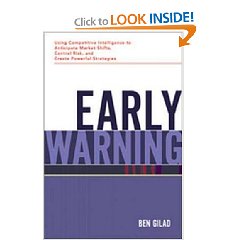Strategy without intelligence, intelligence without strategy
Prologue
Competitive intelligence (CI) began to make inroads at a few leading-edge US companies such as Motorola and Kellogg back in the mid-1980s. Since then, companies have been investing in personnel, software, and consultants’ services to systematically monitor their competitors. At one point in time, (old) ATT had over 30 people in its business services division’s CI department, and pharmaceutical firms were not far behind. Today, 90 percent of all Fortune 500 companies have some form of formal CI activities. Yet, ask top executives to recall one occasion of how CI affected their strategy, and they go blank. Ask them who their intelligence analyst is, and they have no idea. At an age when ‘‘rising global competitive pressure’’ is on every executive’s lips, why has CI failed to leave real impact on companies’ C-suites?
The answer is deceptively simple: companies never built real competitive intelligence capabilities. Instead they created elaborate and detailed practices for closely monitoring competitors’ every little move. How important is bird-watching to an airline pilot flying at 39,000 feet? Competitors just do not matter that much to executives, and rightly so.
That is the good news. The bad news: they never built real intelligence capabilities. Executives short-change themselves like a ship captain navigating in thick fog without radar. Worse, while around him the horns are blaring, he listens only to his iPod.
Benjamin Gilad is President, Academy of Competitive Intelligence, Boca Raton, Florida, USA.
Benjamin Gilad, (2011) “Strategy without intelligence, intelligence without strategy”, Business Strategy Series, Vol. 12 Iss: 1, pp.4 – 11
Purpose – The purpose of the paper is to point out how little competitors matter for companies' long-term success, how little support executives receive with intelligence that does matter, and to offer a different solution.
Design/methodology/approach – The paper uses numerous examples of competitive failures and success that point out the limits of competitors' impact on a company's performance. It covers the theory of strategic positioning and industry change drivers and provides a practical definition of strategic intelligence.
Findings – Competitors do not matter to executives; “competitive intelligence” has been misinterpreted as competitor-watching and has therefore had no real value to executives, and companies leave their executives vulnerable to disastrous blindsiding.
Practical implications – Companies should and could markedly improve their intelligence support of top executives, but need to rethink their whole approach to competitive intelligence. Companies can also significantly improve the way they monitor the competitive environment by redirecting their efforts.
Originality/value – Executives are short changed by their organizations' own processes of closely watching competitors. For the first time, this paper exposes the myth that competitive intelligence – as practised by more than 90 percent of the Fortune 500 – has value for executives and offers a unique approach to improving companies' strategic intelligence capability.








